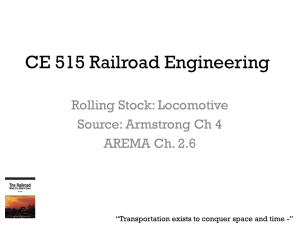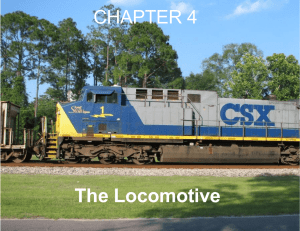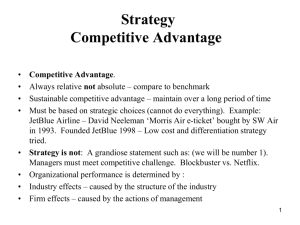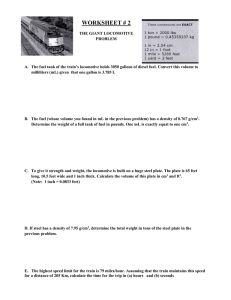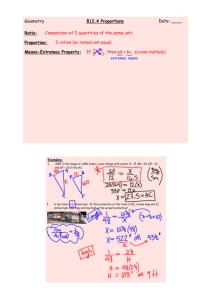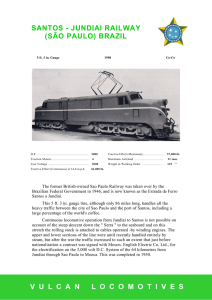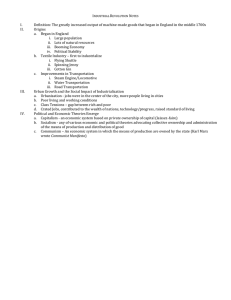GE`s Evolution® Series Locomotive
advertisement
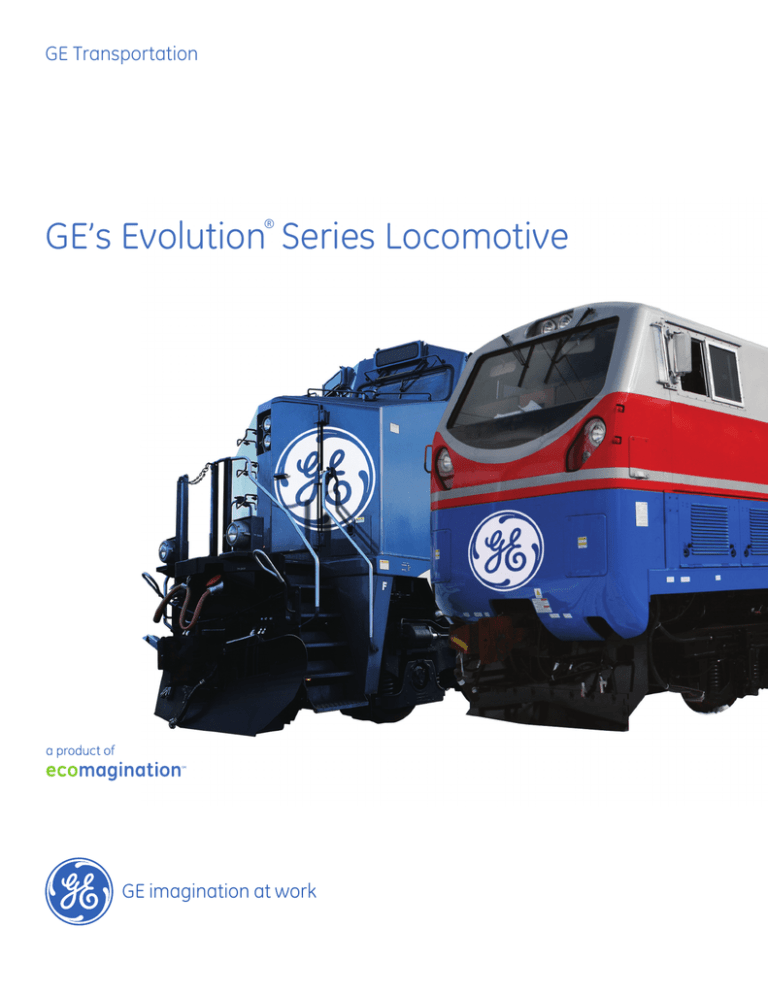
GE Transportation GE’s Evolution Series Locomotive ® GE imagination at work A new generation in GE’s locomotive legacy A product of ecomaginationSM GE was mindful of the environment when it developed For more than a century, GE Transportation has been a global leader in freight and passenger rail. As a principal manufacturer of diesel-electric locomotives, the Evolution Series. Not only was it essential to build a powerful, reliable and efficient locomotive, controlling its environmental impact also was critical. GE Transportation has a rich history filled with industry The results are remarkable: The Evolution Series Locomotive firsts and innovations that have produced a succession represents one of GE’s most prominent ecomagination of world-class models that Include the Universal Series, products. Ecomagination is a GE initiative to bring to the Dash Series, the Blue Tiger, the GENESISTM Series and market new technologies that will help customers the AC4400. Today, GE can add to its legacy the Evolution meet their most pressing environmental challenges. Series, the most technologically advanced, diesel-electric, Those GE products with the ecomagination designation heavy-haul locomotive in the world. undergo a rigorous certification process to prove they measurably The Evolution Series The Evolution Series is the result of an eight-year, $400 help customers’ performance and bottom lines while improving their environmental performance. million investment by GE. Introduced in 2005, it is an incredible combination of power, performance and efficiency. These locomotives provide measurably higher reliability and lower life-cycle costs than previous GE models. They also apply GE’s proprietary AC propulsion technology and control equipment that are more reliable and provide superior performance. The Evolution Series is so powerful that one 12-cylinder locomotive can pull the equivalent of 170 Boeing 747 jetliners. Built on a forwardlooking and flexible global platform, the Evolution Series is designed to meet global market needs and comply with current and future emissions standards. Today, more than 3,700 Evolution Series Locomotives are operating in 10 countries. Reducing fuel use and lowering emissions Evolution Series Locomotives • Use up to 5% less fuel while reducing emissions by approximately 40% compared to previous GE models • Are 6% more fuel efficient than GE’s closest competitor in North America as validated by a nationally recognized, independent research institute • Meet current U.S. EPA emissions standards • Comply with the stringent demands of UIC Stage IIIa emissions standards • Meet Russian GOST Standards and Safety Norms • Are designed to more easily accommodate future EPA, UIC and GOST emissions requirements Technology leadership of the Evolution Series A closer look at the Evolution Series Locomotive reveals how GE’s advanced technology brings savings in fuel and maintenance costs without costing the environment. Evolution Engine Powered by GE’s 12-cylinder diesel engine, the Evolution Series produces the same 4,400 HP as its 16-cylinder predecessor — with less fuel. This 45-degree, 12-cylinder, 4-stroke, turbocharged engine provides efficiency, lower emissions and extended overhaul intervals. The engine also uses enhanced cooling and higher-strength materials that dramatically improve reliability and allow for future increases in power and efficiency. The Evolution Engine has been awarded UIC certificate E-001/2009-02, which verifies the engine’s mechanical quality and compliance with the stringent demands of UIC Stage IIIa emissions standards. The Evolution Series is also offered in a 16-cylinder configuration that delivers 6,000 HP. Air-to-air cooling Dynamic braking The locomotive incorporates GE’s most advanced In addition to air brakes, the Evolution Series is equipped cooling system in rail transport. In addition to a standard with dynamic braking technology that reduces wheel and radiator and fan configuration, locomotives powered by brake shoe wear by an estimated 20 to 40%, depending on the Evolution Engine use an advanced air-to-air cooling usage. Delivering up to 117,000 lbs. of (AC) braking effort, system for engine combustion air to enhance performance the locomotive uses proven grids and blowers from GE’s AC while lowering emissions. 4400 and Dash 9 locomotives. The braking grids are also AC individual-axle traction control Evolution Series Locomotives deliver GE’s industry-leading completely isolated for greater reliability and simplified maintenance. AC individual-axle traction-control technology that enables Computer-controlled architecture greater hauling power by significantly reducing slippage The locomotive features sophisticated operator controls on startups, inclines and suboptimal track conditions. This that improve diagnostics and simplify operation. The unique technology ensures optimum performance, less consolidated control architecture of the Evolution Series wasted energy and substantially reduces maintenance makes it easier to upgrade software and download data. costs and associated down time during the locomotive’s “Smart” displays eliminate several add-on black boxes in life compared to older DC technology traction systems. favor of a computer display combination that enhances both reliability and operator ergonomics. Evolution Series global platform The flexibility to meet localiz In Australia, GE’s Evolution Series Locomotive brings advanced locomotive technology to the energy-intensive mining industry. Rio Tinto Iron Ore depends on Evolution Series Locomotives to support its mining operations in the country’s Pilbara region. In Brazil, the 6,000 HP Evolution ES58ACi was modified to run on biodiesel fuel to comply with Brazil’s renewable energy regulations. These models transport iron ore from the edges of the Amazon region to the port at Sao Luis by Vale, the largest Brazilian mining company. In China, GE’s Evolution China Mainline Locomotive is powered by a 6,000 HP engine. This custom-built locomotive is designed to achieve 75% more HP and produce 28% less nitrogen oxide (NOx) per HP hour than the locomotives in China’s current mainline fleet. In Egypt, Egyptian National Railways (ENR) introduced its first AC locomotive — the Evolution Series — in 2009. Transporting freight and passengers, these locomotives provide best-in-class fuel efficiency to significantly reduce ENR’s fuel consumption. GE Global Research Centers At GE’s four Global Research Centers, more than 2,800 researchers work to uncover technological breakthroughs in all of GE’s businesses. From appliances and medical imaging to jet and locomotive engines, these centers are the cornerstone of GE’s technology leadership. Locations include: Headquarters Niskayuna, New York, United States China Technology Center Shanghai, China John F. Welch Technology Centre Bangalore, India GE Global Research — Europe Munich, Germany GE global manufacturing capabilities and partner facilities Australia, Brazil, China, Kazakhstan, South Africa, Turkey and the United States zed needs around the world In Kazakhstan, Evolution Series Locomotives are assembled in a new plant in Astana, helping modernize the country’s rail infrastructure, diversify its economy and strengthen its manufacturing industry. In Mongolia, the Evolution Series Locomotive runs on the Ulaanbaatar Railway, a key gateway connecting landlocked Mongolia with the countries of Europe, East Asia and Southeast Asia. In North America, Evolution Series Model ES44AC transports raw materials, finished goods, coal, grain and commodities on rail infrastructure. In North America, Burlington Northern Santa Fe Railway is using Evolution Series ES44C4 Locomotives as a cleaner, faster, safer and more reliable alternative to DC-powered locomotives. The advanced technology of Model ES44C4 reduces fuel use by 17% and emissions by 70% compared to existing DC locomotives. Evolution Series by the numbers • Evolution Series Locomotives are the result of an eight-year, $400 million investment by GE. • Its 12-cylinder diesel engine produces the same 4,400 HP as its 16-cylinder predecessor. • More than 3,700 are operating around the world. • When compared to previous GE models, the Evolution Series uses up to 5% less fuel or approximately 1.1 million litres of fuel during its lifetime or enough to power another Evolution Series Locomotive for seven months. • The Evolution Series reduces emissions by more than approximately 40% compared to previous GE models. • Each Evolution Series Locomotive has an annual positive GHG emission impact equivalent to removing 35 cars from the road or planting 55 acres of trees when compared to other heavy-haul freight locomotives operating today. • One 12-cylinder Evolution Series Locomotive can pull the equivalent of 170 Boeing 747 jetliners. • If every freight train in North America were pulled by an Evolution Series Locomotive, the annual reduction of smog-producing pollutants would be like removing 48 million cars from the road each year. • Compared to locomotives manufactured 20 years ago, the GE Evolution Series Locomotive reduces pollution by producing 67 percent fewer particulates and 60 percent fewer nitrogen oxide emissions. Higher-speed passenger rail : the future of the Evolution Series In the 1990s, GE Transportation developed the GENESISTM Series passenger locomotive, a lightweight, low-profile and fuel-efficient model used throughout North America. With increasing higher-speed rail demands, GE is poised to continue innovating and meeting the world’s needs for the next generation of higher-speed rail. This proposed new passenger locomotive would use GE’s Evolution Series technology, reduce fuel consumption and emissions, reach up to 124 miles per hour and use North America’s existing track infrastructure. To learn more, visit www.getransportation.com. GE imagination at work GE, the GE Monogram, imagination at work, ecomagination, GENESIS, Evolution and all other trademarks, registered trademarks and service marks, unless otherwise noted, are owned or licensed by the General Electric Company or its subsidiaries. All other brand names, product names or trademarks belong to their respective holders. 30045-A
